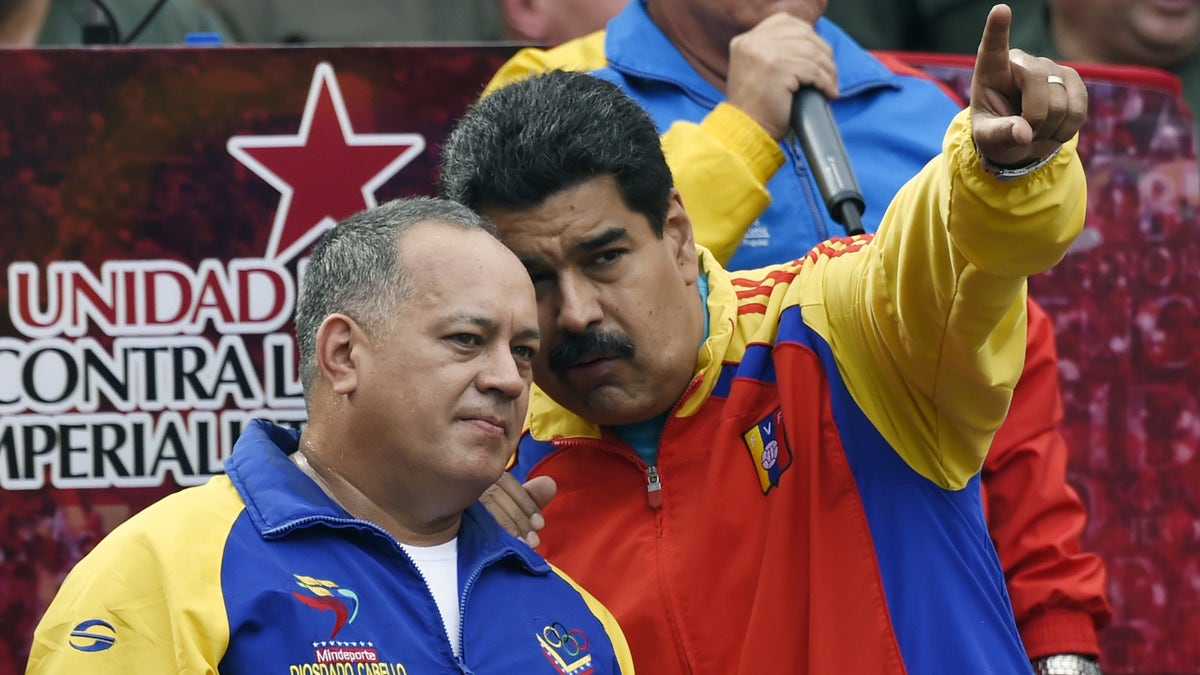
Venezuelan President Nicolas Maduro and Cabello in Caracas on March 15, 2015.
U.S. prosecutors have launched an investigation into several high-ranking members of the Venezuelan government over allegations that they have allowed the South American nation to become a global hub for drug trafficking and money laundering.
According to the Wall Street Journal, federal prosecutors in New York and Miami along with an elite unit of the Drug Enforcement Administration are piecing together a case against Venezuelan National Assembly President Diosdado Cabello and other members of the government of President Nicolás Maduro. The majority of the evidence has come from former cocaine traffickers and informants once close to top Venezuelan officials and defectors from the Venezuelan military.
"There is extensive evidence to justify that he is one of the heads, if not the head, of the cartel," a Justice Department official told the Wall Street Journal about Cabello. "He certainly is a main target."
Lawmakers and journalists were told to be at the Venezuelan National Assembly at 10 a.m. Tuesday. This is the first ordinary session since the investigation became public. The session normally begins at 2 p.m. Lawmakers were publicly invited to attend the session through the Assembly's secretary official Twitter account @SecretariaAN.
Representatives for Cabello and other Venezuelan officials have not responded to a request for comment.
The news of the investigation comes on the heels of the release of a book by Spanish Emili J. Blasco that alleges that the Venezuelan government under late leader Hugo Chávez and now with Cabello supported drug traffickers.
Blasco’s sources most of his information from interviews with Leamsy Salazar, who was once Cabello’s head of security and a former member of Chavez's security detail. Salazar deserted the military earlier this year and made statements to U.S. media about Cabello’s alleged drug trafficking ties.
In the book, Salazar describes a scene in 2007 at a farm near Venezuela’s border with Colombia where Chávez negotiated with FARC guerrilla leaders to trade drug shipments from them in exchange for weapons and military supplies.
Salazar said that after Chávez’s death, Cabello became the organizer of the Venezuelan government's drug trafficking and criminal activities. During one alleged mission, Salazar said he was present when Cabello inspected four go-fast boats that were loaded with several tons of cocaine and days later was present when a number of suitcases loaded with stacks of $100 dollar bills was delivered to Venezuela's tax agency, where Cabello had an office.
Cabello is considered the second most powerful figure in Venezuela's ruling party, after Maduro.
U.S. officials say that the rise in the Venezuelan government’s complicity in the drug trade occurred as neighboring Colombia began to crackdown on the illicit business. In Venezuela, drug traffickers found a more willing and open country – mostly out of U.S. oversight – to work in.
"Most of the high-end traffickers moved to Venezuela in that time," Miami-based attorney Joaquín Pérez, whose Colombian trafficker clients have admitted to operating out of Venezuela, told the Wall Street Journal.
While the administration of U.S. President Barack Obama is not involved in the investigation into Cabello and other Venezuelan officials, any indictments levelled against the Venezuelan officials could result in a flurry of anger from leaders in Venezuela that could push the already strained relations between Caracas and Washington to its nadir.
In March the Obama administration slapped sanctions on high-ranking political and military figures in the South American nation for their role in the bloody crackdown on protestors last year – a move that Maduro called "greatest act of aggression" by the U.S. against his country in history.
"President Barack Obama, in representation of the imperialist elite of the United States, has decided to personally take on the task of overthrowing my government and intervening in Venezuela in order to control it," Maduro said, according to the Miami Herald.
Includes reporting by Carlos Camacho in Caracas.
